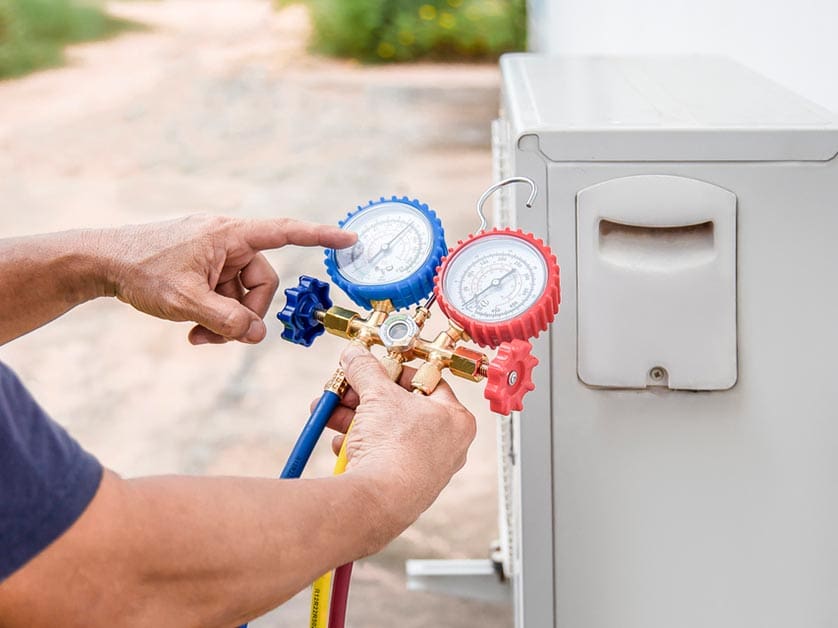HVAC Technicians’ Approach to Assessing Refrigerant Levels
We all know how important it is to keep our HVAC systems running smoothly year-round. HVAC technicians play a crucial role in maintaining and optimizing the performance of air conditioning and refrigeration systems, including checking and managing refrigerant levels in these systems. Our heating and air conditioning repair team at Stone Heating and Air discusses how they do it and why it’s so key to your system’s operation.

The Role of Refrigerants in HVAC Systems
Refrigerant is a special fluid that your HVAC system uses to cool and heat your home. It absorbs the heat from your room and releases it outdoors in the summer while doing the opposite during the winter. Proper refrigerant levels are vital for efficient and effective cooling. Improper levels can lead to system malfunctions, decreased energy efficiency, and potential damage to the equipment.
How HVAC Technicians Check Refrigerant Levels
When a professional checks your refrigerant levels, they conduct a visual inspection before starting any diagnostic procedures. They check the HVAC system for any signs of refrigerant leaks, which can occur in the evaporator, condenser, or connecting lines. Any signs of oil or refrigerant residue around these components indicate a potential leak that must be addressed before proceeding.
They then use special tools to measure the pressure within your system, which varies depending on the type of refrigerant used and the current weather conditions. For example:
-
Pressure Gauges. HVAC technicians use pressure gauges to measure the pressure of the refrigerant within the system. They compare the pressure readings to the manufacturer’s specifications or a pressure-temperature chart to determine if the refrigerant level is within the appropriate range.
-
Subcooling and Superheat. Technicians use subcooling and superheat measurements to assess the refrigerant charge. Subcooling is the temperature of the refrigerant liquid as it leaves the condenser, while superheating is the temperature of the refrigerant vapor as it exits the evaporator. Measuring the temperatures and comparing them to the recommended values helps them determine if the refrigerant level is correct.
-
Refrigerant Scale. For systems that allow access to the refrigerant, technicians may use a refrigerant scale to weigh the amount of refrigerant added or removed during maintenance. This method ensures a precise measurement of the refrigerant.
If your system has less refrigerant than it should, it often indicates a leak requiring immediate HVAC repair.
The Importance of Professional HVAC Services
Tinkering with your HVAC system’s refrigerant levels is not a DIY job. Improper handling can lead to leaks, harming the environment and putting your system at risk. That’s why professional HVAC technicians are essential for services such as checking refrigerant levels and performing necessary repairs. They possess the skills and equipment to get the job done, and can ensure your system operates safely and efficiently.
When to Consider HVAC Replacement
If your HVAC system is constantly having refrigerant issues despite regular checks and repairs, it could be time for a complete replacement. An older system might also be less energy-efficient and may use a type of refrigerant that’s already phased out due to environmental concerns. In such cases, a professional HVAC technician can help you determine if a replacement is the best option for you.
We Can Maintain Your Refrigerant Levels
Maintaining optimal refrigerant levels is key to keeping your HVAC system running at its best. Remember, this isn’t a job for amateurs. It requires professional expertise. Whether you need repairs or an HVAC replacement in Central Point, OR, contact Stone Heating and Air at (541) 855-5521. You can also visit our contact page to schedule an appointment!
Category: HVAC
Request An Appointment
Related Content




